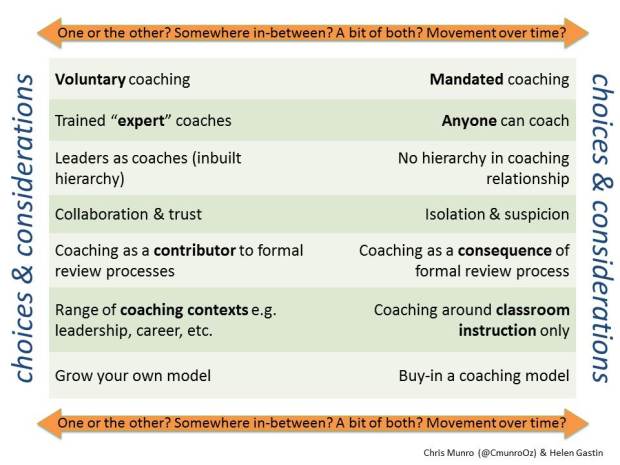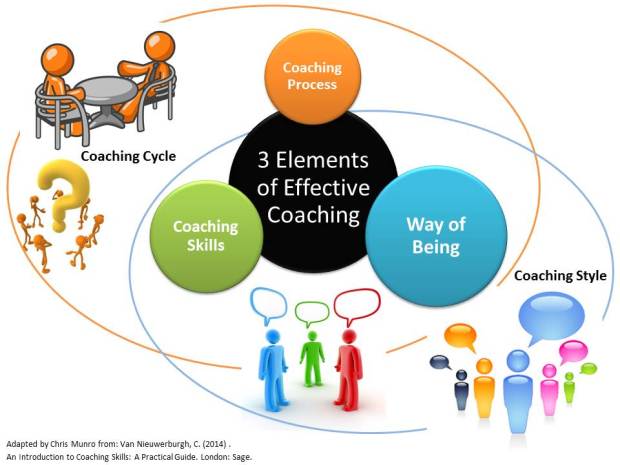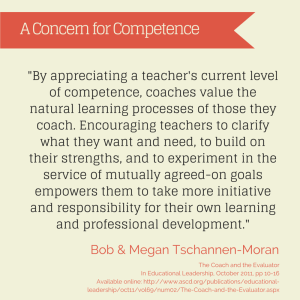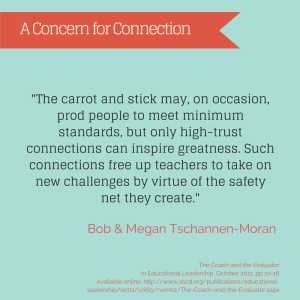In previous posts I’ve talked about “the why” of coaching and a bit about coaching systems, models and cultures. This post is about some of the choices and considerations that have had to be made as we have developed the beginnings of what might be described as a coaching model on our site. It’s one thing getting your head around a coaching system and being able to have productive coaching conversations on a one-to-one basis but quite a different prospect to think about scaling this up to a whole school level where, ideally, all staff have access to coaching. We haven’t got there yet but we have grappled with lots of the issues around how to get moving along that path. The slide below shows some of the issues on a continuum. The important point is that these are some of the considerations that will determine the kind of coaching model created.
Let’s consider each of these in turn.
Voluntary v mandatory coaching
Taking account of the pre-existing ways of working in your school and how coaching might fit into a suite of professional learning options might dictate how you respond to this choice.
We have started with volunteers with the aim of building momentum and trust from a coalition of the willing. Some key questions to consider might be: Do you see coaching as a gift? …or an entitlement? …an investment in people? What if teachers don’t want the gift? Can everyone be coached? @debsnet wrote an interesting piece on this very question here. With mandated coaching, there is potentially the problem of passive resistance to the process with many teachers just going through the motions. This won’t necessarily be widespread depending on the pre-existing culture in your school and the level of engagement with staff prior to the mandate.
Jim Knight explains the enrolment phase of the instructional coaching model here. He proposes five methods of enrolling teachers with the very last one being “administrator referral”. Here he cautions against coaching being seen as punishment for under-performance rather than a support. Coaching can be much more palatable when offered as one (high impact) option among a range of professional learning choices.
Expertise v everyone
Having been immersed in a Coaching Accreditation Program alongside another colleague, I feel that in our context we really needed this to help develop the coaching model and to keep momentum going as we worked through a pilot project. Whether or not you acquire some coaching credentials perhaps doesn’t matter but I would suggest that you do need to have a strong base of in-house expertise to support the process and to develop others. Importantly, if the license to develop this expertise is given by school leadership, and coaching is publicly endorsed, then buy-in from staff is more likely. As I mentioned in my previous post, coaching is not just a protocol or system – it can’t be handed to people in a manual and expected to work. Use the phrase “we all coach” with caution. Can we all coach well?
Leaders as coaches
Having school leaders adopt coaching roles can work, but this needs to be done with great caution and clarity of intent. Trust and authenticity are cornerstones of effective coaching. Can we truly have that (and confidentiality) when you know that you are answerable to the person coaching you? Again, the answer to this question will depend on your conception of leadership and your perception of the culture in your school. A coaching style of leadership is entirely possible but is it “pure” coaching?
This is a point where it may be helpful to make the distinction between a coaching cycle – intentionally entered into by two people and undertaken as a defined professional learning activity over an agreed period of time, and a coaching style – where conversations across a range of contexts draw heavily on coaching skills and those involved interact in a way that makes the exchange more respectful and empowering. I’m still grappling with this one but what I do know is that becoming a coach is changing the way that I have conversations in every aspect of my life.
The image below is an attempt to show the overlap between the elements that contribute to an effective coaching cycle, in the conventional sense, and those elements that come to the fore when one adopts a coaching style of conversation in more general circumstances.
School Culture
The pre-existing culture of collaboration in your school will dictate how you initiate coaching (or any other new way of working) and how fast you can go. Are your classroom doors open? Do teachers already observe each other? What opportunities are there for discussion and genuine collaboration? How do you know?
In this TER Podcast Glenn McLachlan of Knox Grammar in Sydney describes his school’s model where every teacher has a coach. He talks about how they “sold” it to staff and, importantly, points to the groundwork that had already been done to create an existing culture of peer-collaboration through lesson observation and feedback. This model could be seen as the “luxury model” where there has been significant investment and restructuring to support the initiative. Nonetheless, there is much to be learned from the way coaching expertise has been developed at Knox and how this is now being supplemented by Instructional Rounds. (Note: the whole Podcast is great but Glenn’s bit starts at 36 mins)
Review Processes
We could describe this as “coaching as a supplement” versus “coaching as a treatment”. This point is about where coaching fits in your pre-existing systems of accountability (if at all). If you have a very loose system of annual review or appraisal, the development of a coaching model may well act as a catalyst for having a closer look at this process. On the other hand, there may already be a rigorous process in place for staff goal setting and review and coaching may just be another form of learning that teachers bring to this process.
In this excellent article Bob and Megan Tschannen-Moran discuss the tensions between evaluation and coaching.
In this short article John Campbell suggests an alternative (coaching-based) approach to performance conversations.
In this blog post Edna Sackson proposes a move away from traditional forms of teacher appraisal to what she calls a Growth Review based on coaching principles.
Coaching contexts and goals
What is the purpose of coaching in your context? How do you maintain a high degree of “freedom within form” if you opt for a narrower range of allowable coaching areas or advocate particular strategies? What’s your point of reference or evidence of the current reality used to identify the goal? Do you use the AITSL Standards or another framework such as Danielson’s? Do you have your own teaching and learning framework? What other data do you have that could be utilised by teachers to identify goal areas?
We have started broad in order to allow teachers to experience the process and to build trust. We will coach on any aspect of the teacher’s work. If it’s their burning issue and the rationale for addressing it is grounded in a desire to improve the student learning experience in some way, then let’s start there. Fundamentally, this is about respecting the professionalism of teachers as the contextual experts.
Developing a model
The last one is a biggie! There are lots of consultants out there ready to take your money. Be cautious! External consultants can certainly bring vital expertise and insight, and the best ones help schools to question current practice and uncover blind-spots. The ones I worry about are those who claim to have all of the answers and those schools that (with very good intention) buy-in ready-made solutions then impose them on their staff without doing the necessary “hearts and minds” work. Some questions to ask ourselves might be: How does the work that has been done in partnership (hopefully) with external consultants need to be adapted in our context? How do we share the thinking and learning of those closest to the “project” with wider staff? Do we allow sufficient time to answer the burning questions and address concerns?




Hi Chris, this is a terrific post, and its going to take several readings to absorb. Thank you for creating such a useful resource for people like me bringing coaching into our schools.
I find your continuum very helpful, as using that I can quickly identify where we are as a school, and use it as a discussion starter for where we’d like to be. You haven’t ascribed values to either end of the continuum, and that’s useful too, because we can bring that into our own context and work out where we’d like to be based on our values and context.
My preference is for voluntary coaching, though I believe coaching principles can be applied to any conversation and context. As a school leader, I apply coaching principles to a performance conversations I have those I supervise, but I’d prefer not to be their coach. Being both the coach, and the person who evaluates their performance, and, if they’re not permanently employed can have significant input into whether they have a contract the following year muddies things somewhat.
That said, I don’t have an issue with leaders as coaches – I just try to ensure that the heirarchy that does exist isn’t going to impact the coaching session.
I would also definitely lead towards the “grow your own model” of coaching, rather than pay for a consultant to plant one in my school. This is why I love your post so much. You’ve provoked a lot of questions that are very helpful for me in considering what our model may eventually look like.
LikeLike
Thank you for this very affirming comment, Corinne. I’m delighted at the way you have received and interpreted what I’ve written. Just what I was aiming for. Context is everything here and I was hoping that these would be read as “considerations” rather than advice on what to do. Maybe my coaching mindset is showing through in that I’m aiming to raise awareness and empower people to make their own choices. Thanks again. Much appreciated.
LikeLike
I am really enjoying reading your posts from here in Canada! In thinking about my own context, I move back and forth along the continuum you have laid out. What I am really rumbling with right now is the challenge of building a coaching culture in a mandated coaching context. It certainly has its benefits (whole district impact and funded Mentor-Coach training) and its challenges (resistance/ buy-in and Mentor-Coach selection challenges). Thanks for blogging your experience.
LikeLike
Hi Trista,
Thank you for taking the time to read my posts and to leave a comment. It’s nice when something I’ve said here resonates with others (and in Canada!). As I keep saying, this stuff is highly contextual and this is only one story of one journey.
The issue of mandating coaching for all is a tricky one. I recognise the benefits and challenges you describe. Sometimes teachers see it as an unsolicited ‘gift’ (especially if they don’t have a relationship with you already) and would like to ask for the gift receipt to return it! I suppose it comes down to how you build and enact the role that you’ve been given so that you can build a group of advocates willing to tell others what ‘this coaching thing’ is and isn’t.
I’m interested in your role. Do you work across a district or are you assigned to one school? Did you work at that school before? Who do you report to? How is the role framed?
I would imagine that all of these factors, and more, will impact on how you go about your work with teachers.
All the best,
Chris
LikeLike